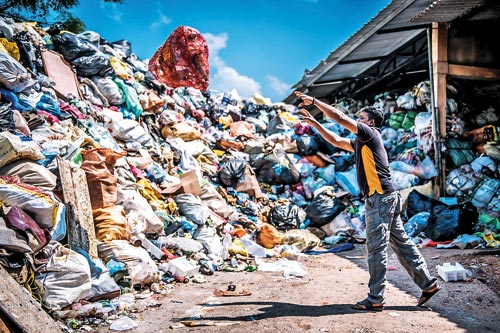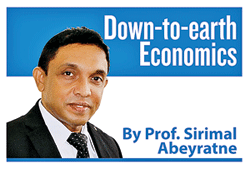Tax and corruption
View(s):
Environmental pollution is also a deterrent to tourists.
We spent two days with our family friends from the Netherlands, Jacque van den Bos and his wife, Gonny, during last week. Jacque has been an investment advisor by profession and has acquired international experience by working in the EU. They were here in Sri Lanka for about three weeks, visiting different parts of the country, during which they didn’t forget to visit us too.
They have been frequently visiting Sri Lanka for many decades now, covering many parts of the country. Because they have seen both adorable and abominable things here, in Sri Lanka there is nothing bizarre to Jacque and Gonny.
Because they have covered almost every part of the country, it is more sensible to ask them where they haven’t been in Sri Lanka, instead of where they have been.
This time, they visited Delft island in Jaffna too because it is one of the few places they have missed so far. However, their visit to Delft has been a harassing experience for them. It is not because of the underdeveloped nature of the island, but much more than that the underdeveloped behaviour and the systems that they must deal with.
Above all that, how the locals, including the authorities are insensitive to the environment pollution was something that did not go unnoticed. As there were no proper systems in place, officials, security personals and the local influential people received or acquired priority in public places including transport.
“Since we have never been to Delft, this time we decided to visit there too”, Gonny told us.
I told them: “Delft in the Netherlands and Delft in Sri Lanka are two different worlds!”
Human footprints
For the two days they spent with us, sometimes travelling with us too, we had lots of time to discuss not only about ourselves but also things in the Netherlands and in the EU as well as about Sri Lanka. This time they visited Sri Lanka almost after five years. If it’s not for the collapse of international travelling due to the COVID pandemic, once in every two-three years, they have been visiting Sri Lanka.

This time, they have noticed further deterioration of economic standards of the country and increased poverty of the people as well as worsened road discipline and public works. Lack of road discipline and the habit of littering either sides of the roads are two distinctive issues that anyone from a country with better systems in place can notice immediately.
While observing the littering issue and plastic problem in the country, just for the three weeks they stayed they have seen a few road accidents too. One of them has been a tuk-tuk which has got crushed by two big vehicles, in its attempt to creep through them.
“I noticed that lots of tourist hotels are coming up and the Government is promoting tourism as a short-term remedy to generate foreign exchange. But it is a difficult job, if the country ignores environment pollution and the road discipline.” Jacque commented.
I had no reason to disagree with him. We try to promote tourism internationally and try to find ways to grab their last dollar, but little is done in order to make Sri Lanka one of the best choices for tourists. In fact, both environment pollution and road disorder may be less-complicated issues to deal with, while they can even generate a good non-tax revenue for the government.
The way out
Sri Lanka’s economic crisis, along with EU’s energy costs and inflationary pressure, were common topics that I and Jacque were both interested in so that often we ended up getting there. In a shocking comment, Jacque once said that it’s difficult for
Sri Lanka to make a significant way forward, unless the country solves two important issues: “tax and corruption”.
Being an investment advisor by profession, he knows what he says. He further explained: Without collecting income taxes, government cannot rely on indirect taxes to reduce budget deficit. This means that the government must continue with borrowings. Without solving the corruption issue, the government cannot win investor confidence so that investors don’t want to come either. Without investments, the country cannot generate incomes and jobs so that there will be no hope for high growth.
If Sri Lanka should get out of the crisis and improve its economic progress, it must solve the tax problem and corruption issue. The two are related issues; corruption can be one of the reasons for the lower tax revenue, while corruption can flourish when the tax system is weak.
Jacque was speaking of his extensive knowledge in tax administration in the EU countries in general and in the Netherlands in particular. Netherlands is a small country in the EU, with 17.5 million population compared with 22 million in Sri Lanka. However, its labour force is closer to 10 million, which is much bigger than 8.7 million in Sri Lanka.
Midnight surprises
Government’s tax revenue in the Netherlands accounts for over 24 per cent of GDP, compared with little over 7 per cent in Sri Lanka in 2021. More than half of the tax revenue in the Netherlands is generated from direct taxes, which is only 22 per cent in Sri Lanka.
Since the direct tax revenue is too small in Sri Lanka, the government must rely more on indirect taxes – VAT, import duties, and numerous other taxes on goods and services. In attempting to raise the tax revenue, the government usually looks into indirect taxes and their ad hoc revisions through “midnight” gazette notifications further distorting the tax system and promoting corruption as well as sabotaging economic progress.
Personal income tax system in the Netherlands is detailed and comprehensive applying on income, wealth and assets. Incomes included salaries, pensions, social benefits, rents, interests, and earnings from savings and investments. Resident taxpayers in the Netherlands must pay taxes on their entire income worldwide and not just income earned within the Netherlands. Non-resident taxpayers must pay income taxes on their incomes generated within the Netherlands only.
Since the country has a technology-based tax administration system and all types of transactions are through the formal channels, every resident or non-resident taxpayer is virtually in the tax net. Therefore, the tax base is wide and tax avoidance is difficult. And after all personal incomes worldwide should match the personal expenses.
Reluctant to change
The main issue in Sri Lanka is that the government doesn’t have a technology-based effective mechanism to report and record people’s income, wealth and assets. Declaration of one’s tax returns is voluntary, although in the recent budget speeches it has been spelt out some directives to the people to make it mandatory and to open income tax files; yet their success is yet to be seen.
Opening tax files is one thing, while earning incomes and carrying out transactions is another thing. Without a technology-based national information system it is difficult to match the incomes and spending not only worldwide but also within Sri Lanka. If there is no system as such, there is space for corruption, bribery and undue commissions.
In fact, a technology-based information system is also an answer to the widespread corruption in Sri Lanka. In that sense, Sri Lanka promotes corruption by not having a technology-based effective tax system that captures personal incomes, wealth, assets and expenditure.
By the way, according to the Corruption Perception Index, the Netherlands, having scored 80 in 2022, is among the top-10 least corrupted countries in the world. Compared with that, with the score of 36, Sri Lanka’s position in terms of corruption perception is below the world average. The issue in question is not only the lower ranking, but also the “reluctance” to make a change over many years in the past.
(The writer is a former Professor of Economics at the University of Colombo and can be reached at sirimal@econ.cmb.ac.lk and follow on Twitter @SirimalAshoka).
Hitad.lk has you covered with quality used or brand new cars for sale that are budget friendly yet reliable! Now is the time to sell your old ride for something more attractive to today's modern automotive market demands. Browse through our selection of affordable options now on Hitad.lk before deciding on what will work best for you!


